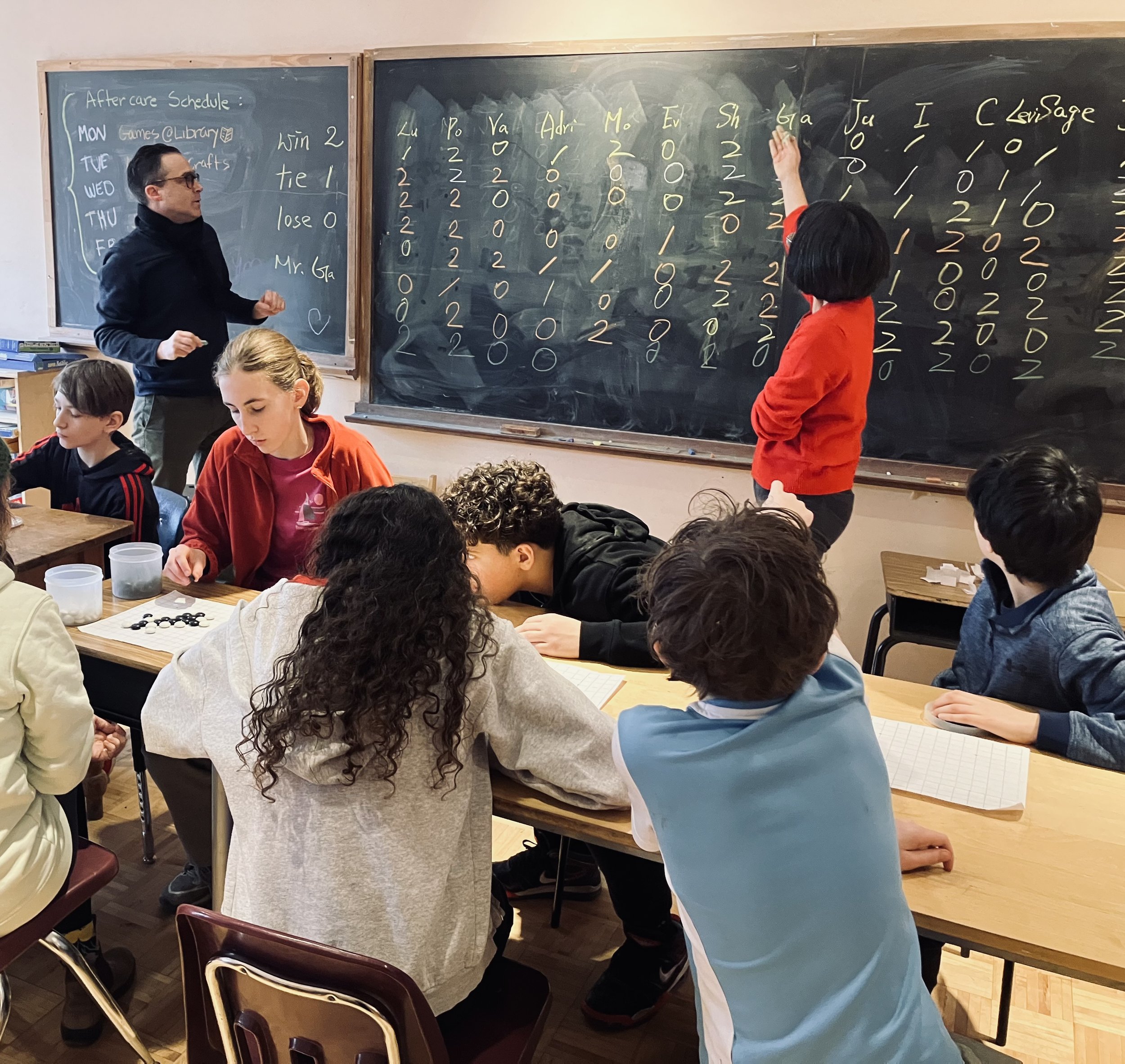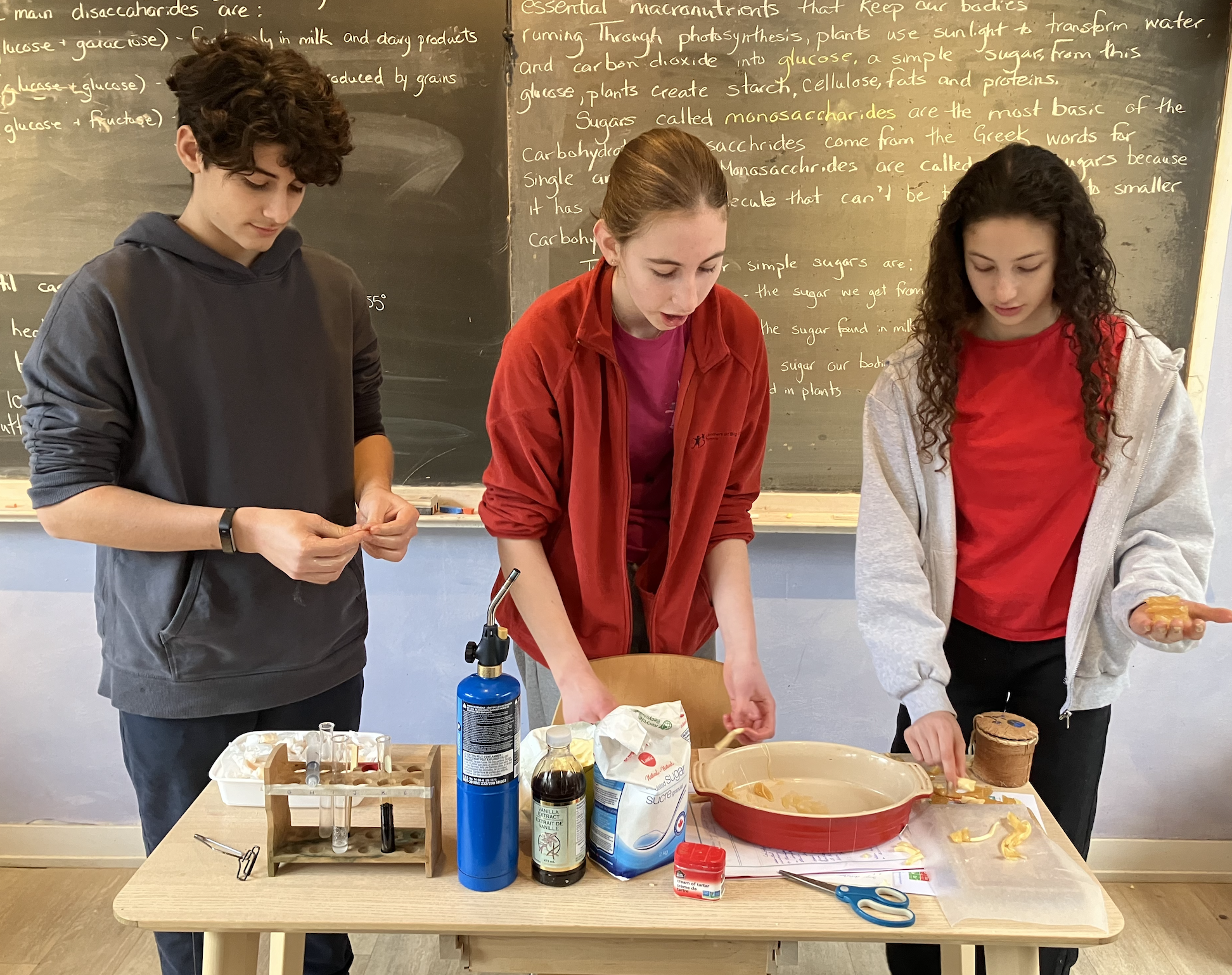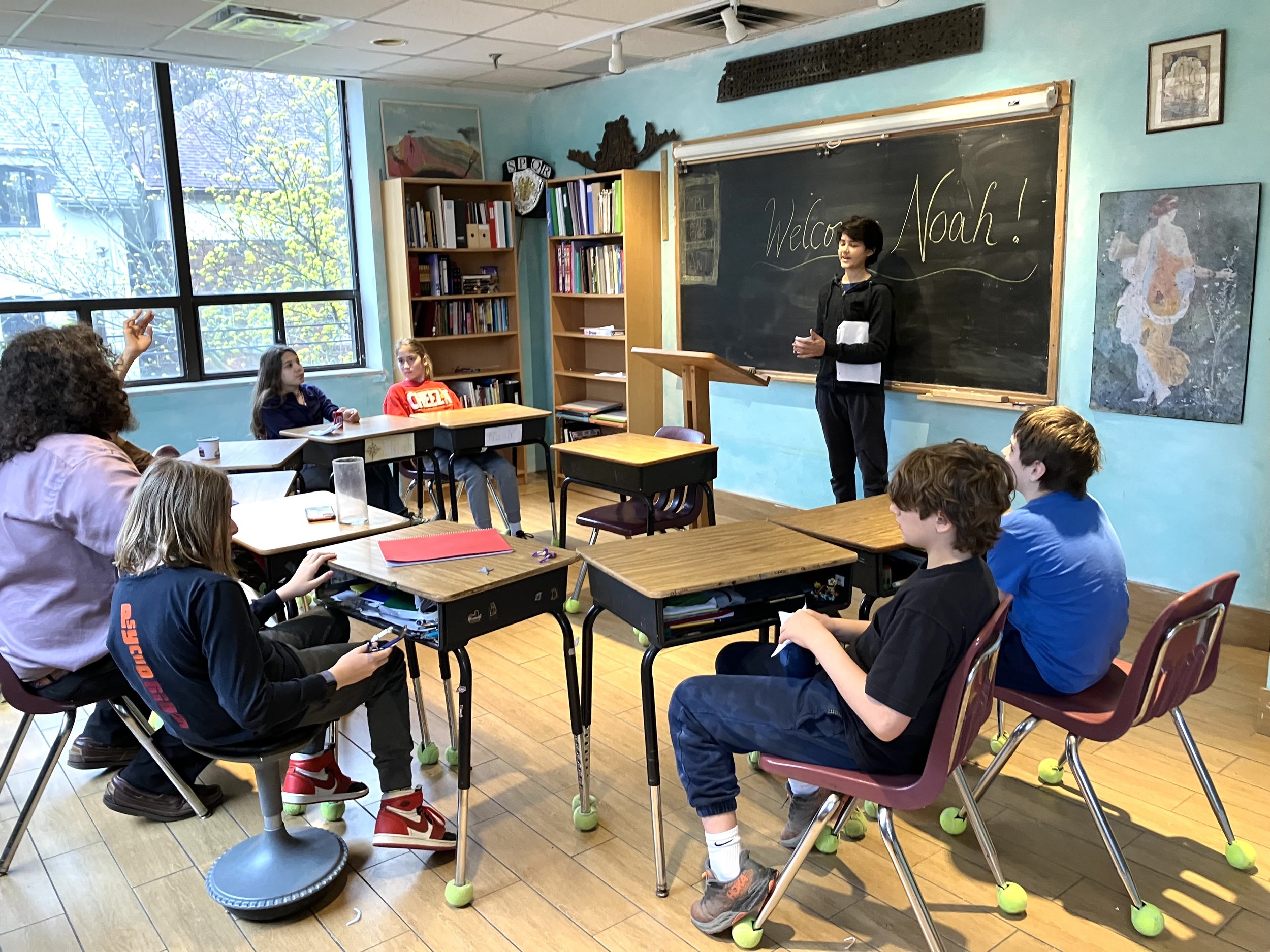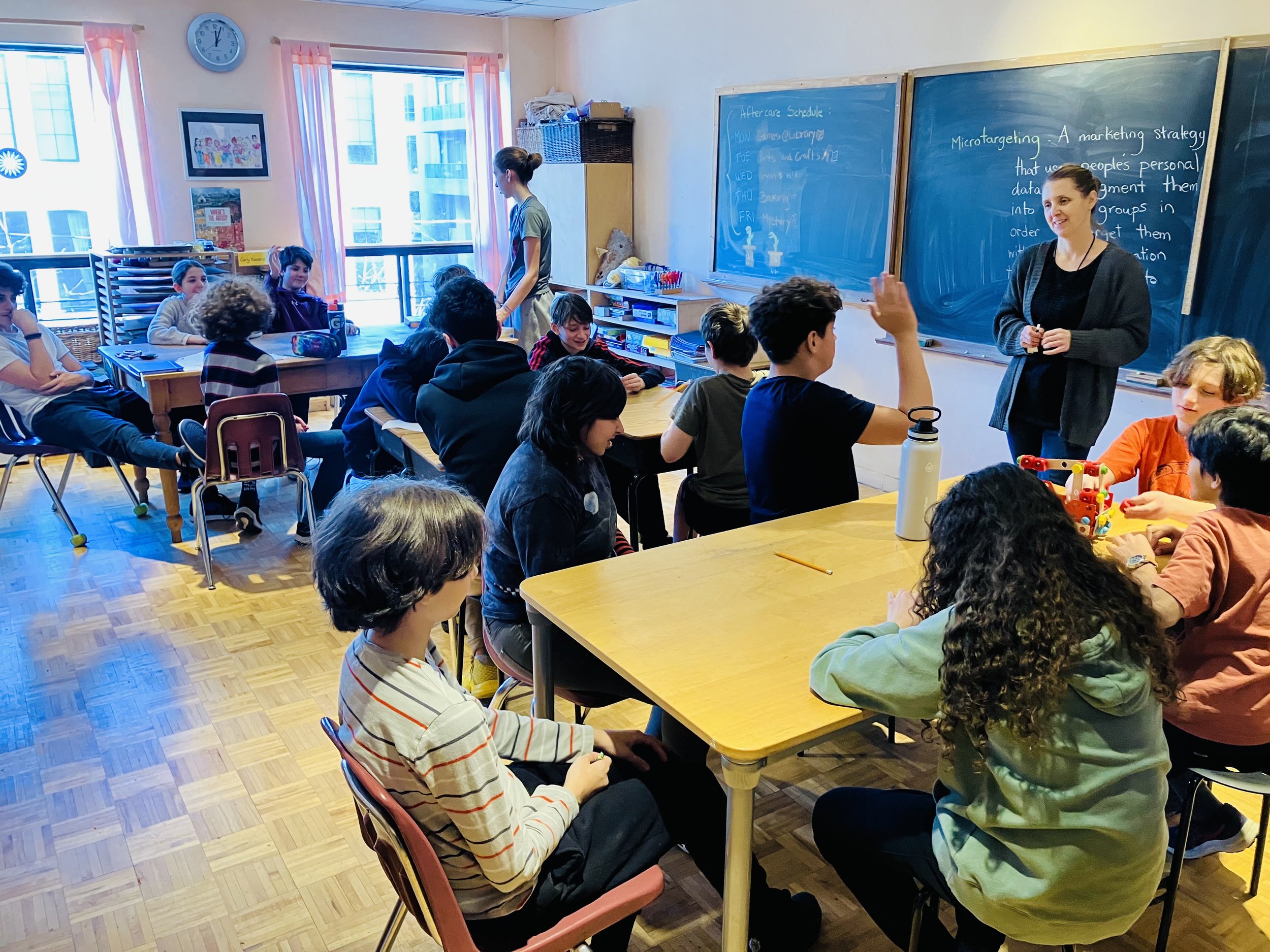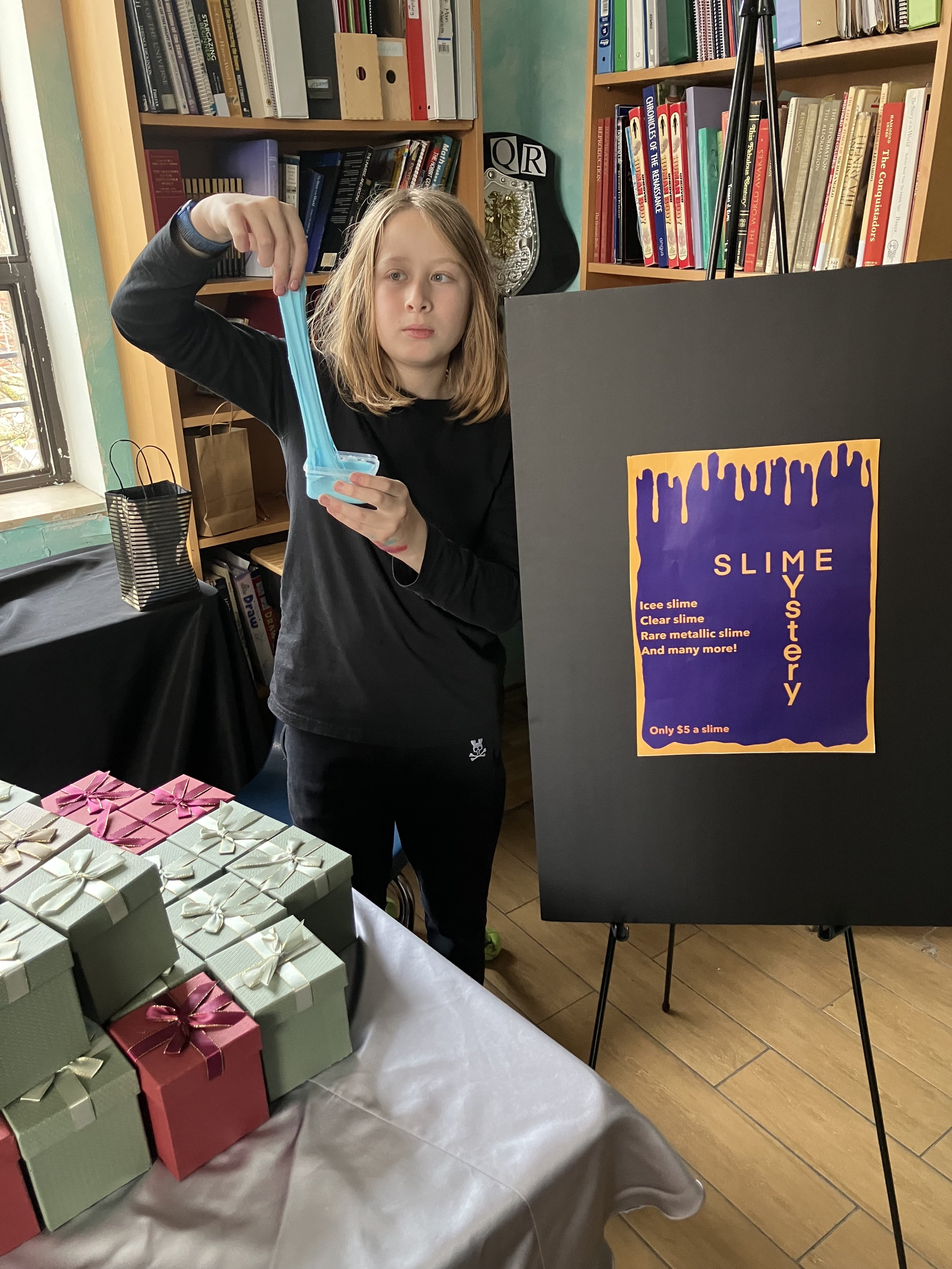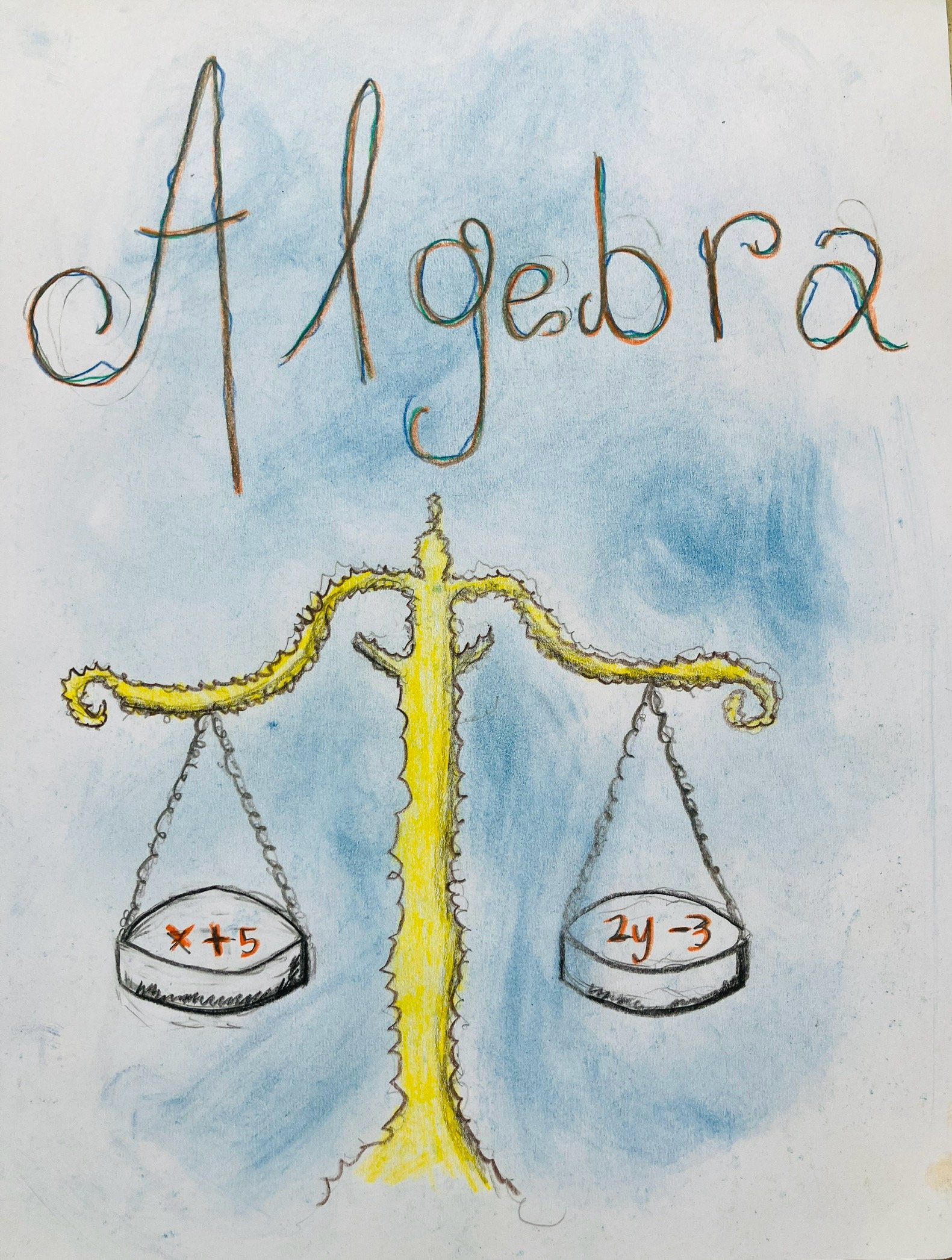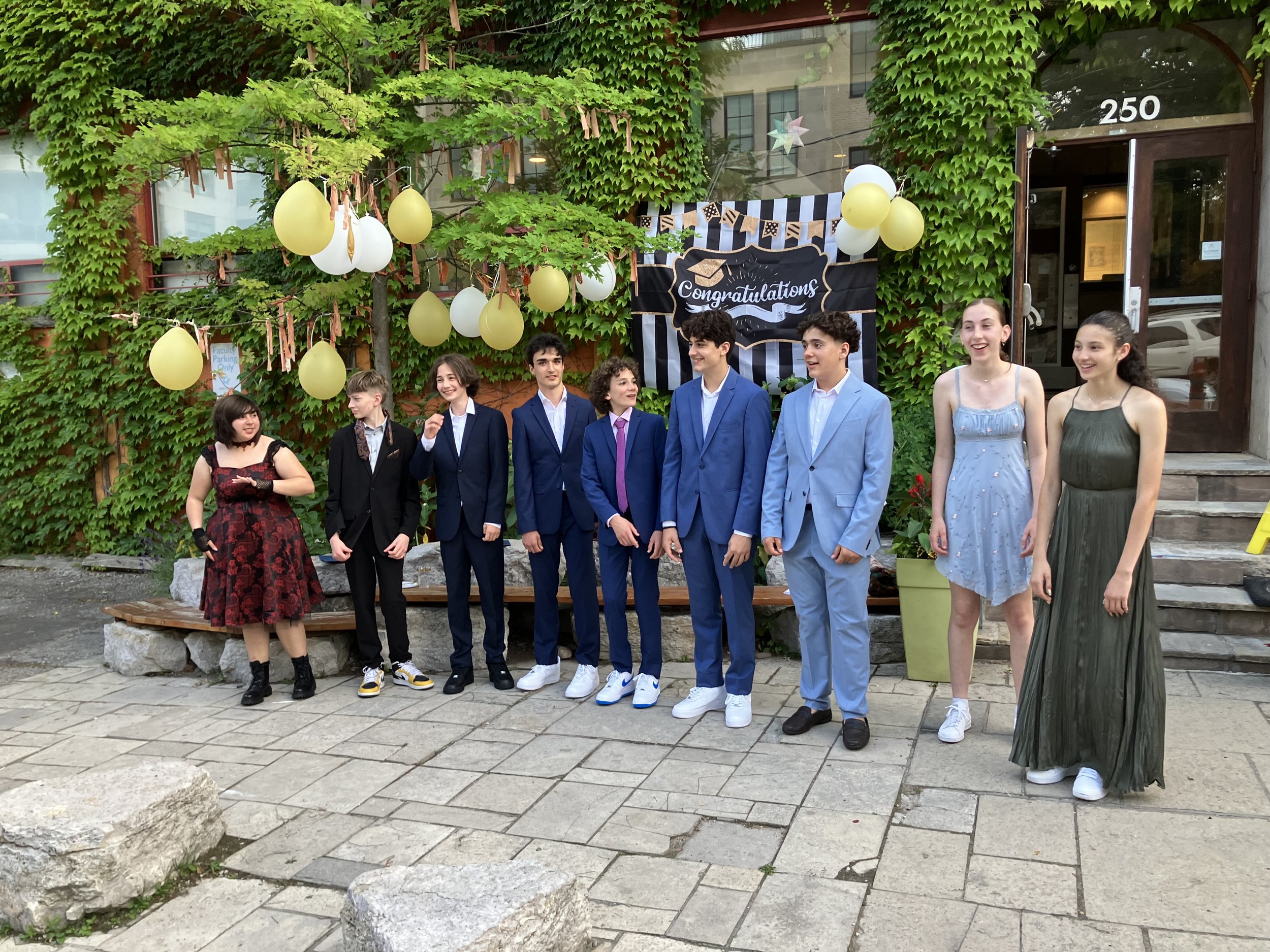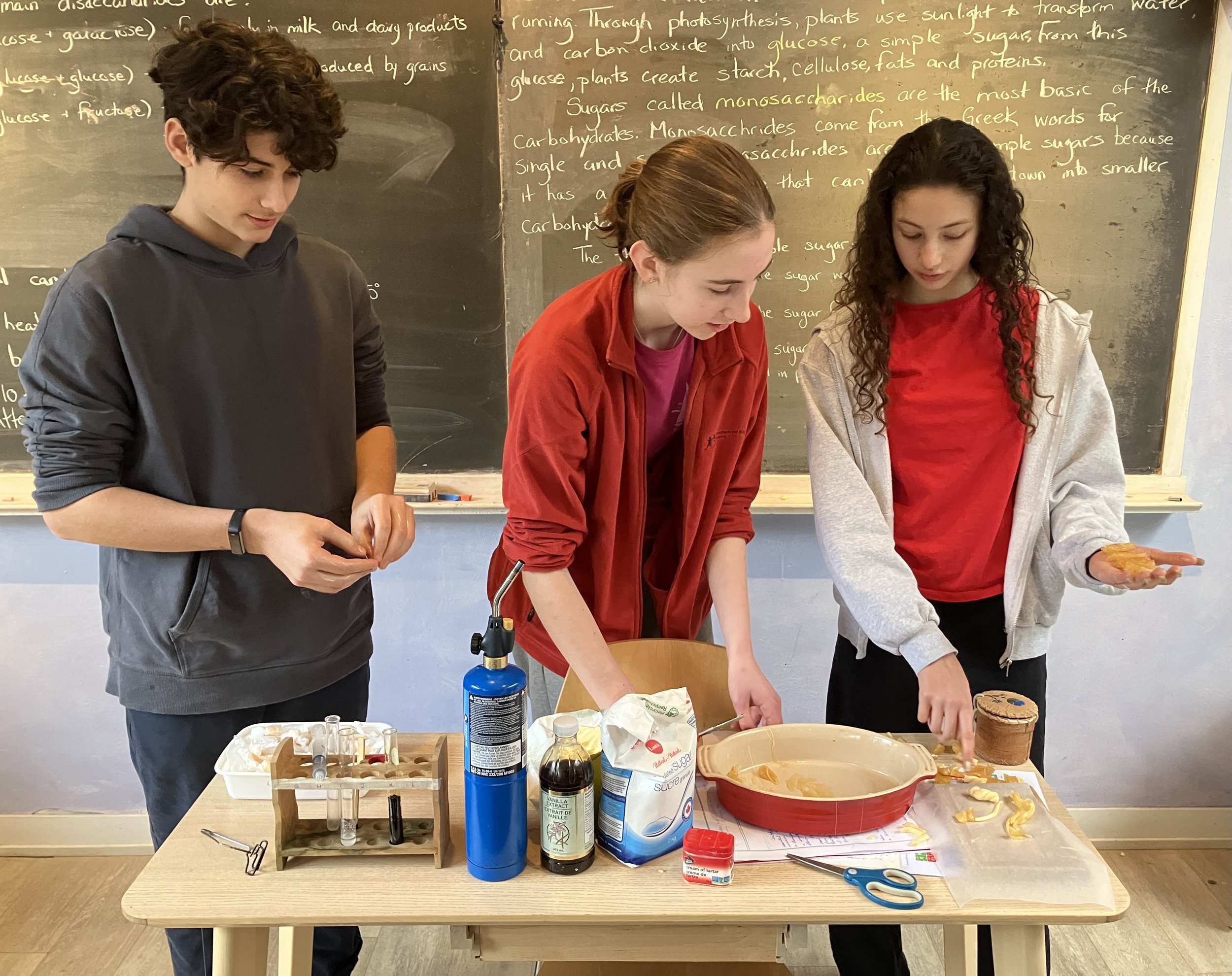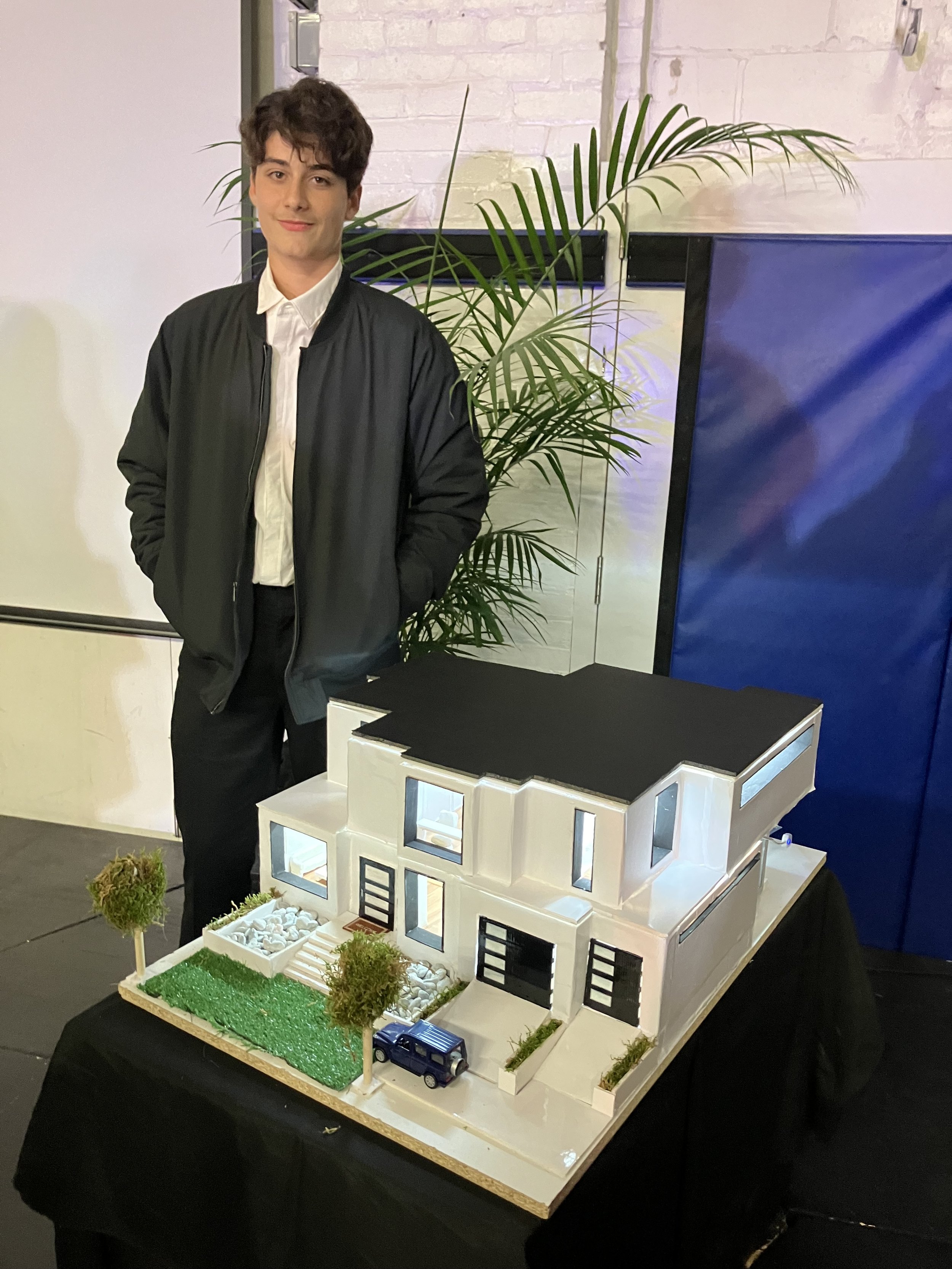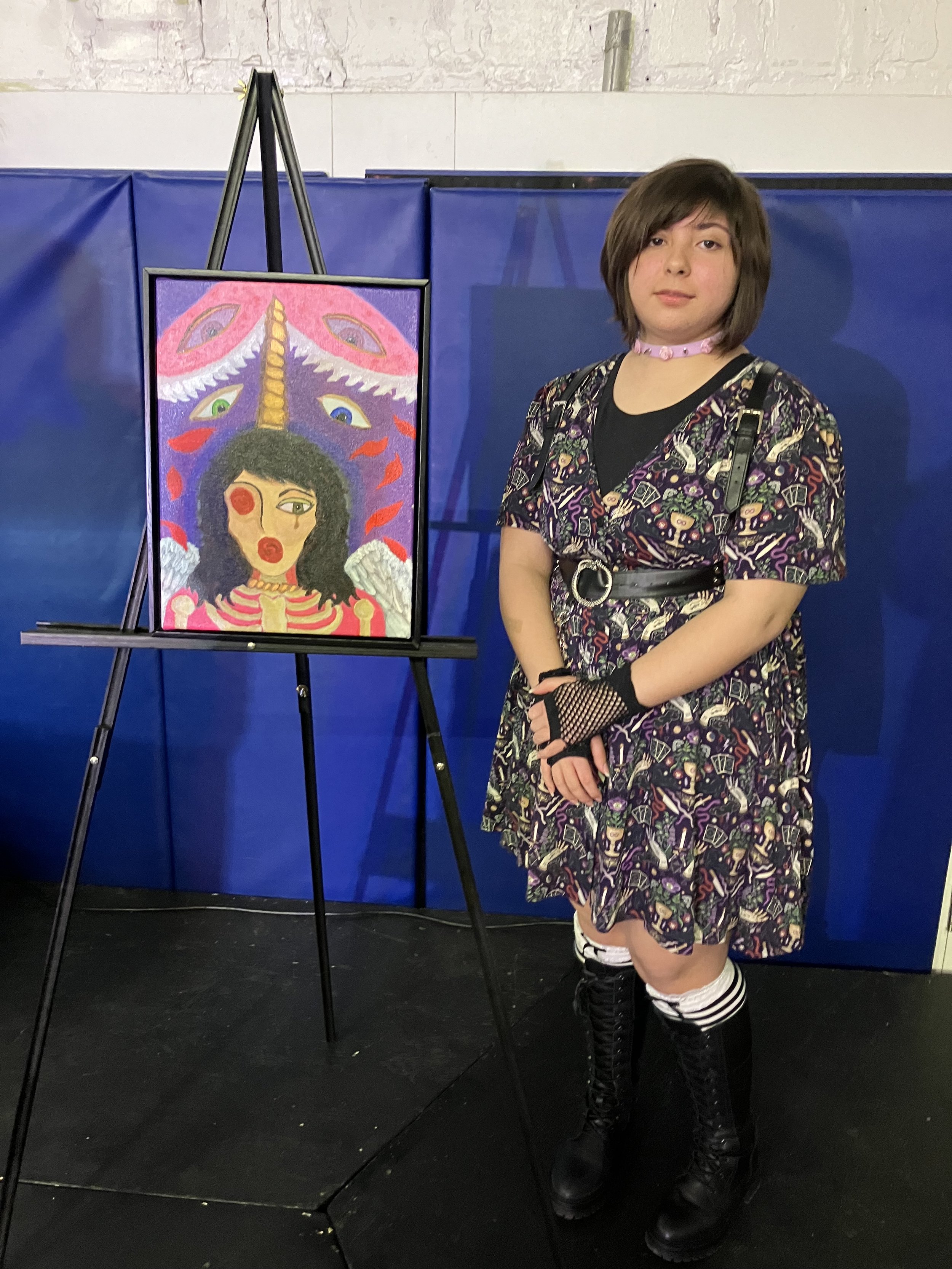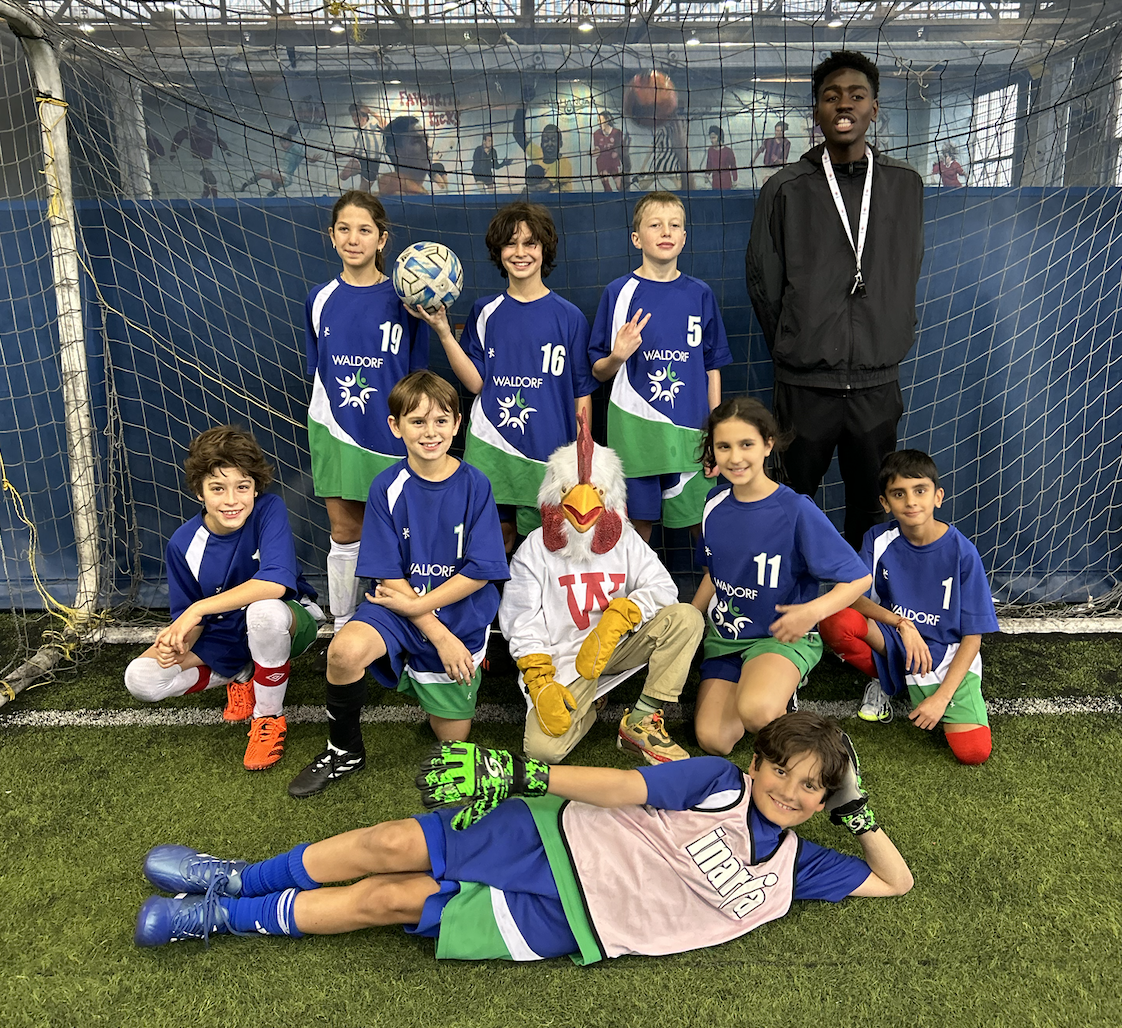Waldorf Middle School (6-8)
Our curriculum is uniquely designed to meet the challenging stages of adolescence. The overarching themes of Middle School at Waldorf Academy are the Age of Exploration, the Renaissance, and Revolution. At this stage, students are beginning to explore new concepts, to question authority, and to find causes they will support. Our curriculum responds to the existential questions, “Is there such a thing as absolute truth?” “Is the world essentially a good and beautiful place?” and “What will be my unique contribution to the world?”
The goals of the Waldorf Academy’s Middle School are to encourage and inspire students to:
Think clearly and independently
Question the status quo
Find things out for themselves rather than from peers or authority figures
Exercise increasing executive function and internal motivation
Study and work to satisfy their own desire for learning
Have a sense of their own dignity as human beings
Have a sense of belonging to the world and of being needed in the world
Grade 6
The Grade 6 student is in a phase of intense intellectual and emotional growth. This phase is marked by increasing objective reasoning and critical thinking. Our phenomenological approach to science fosters this growth, as students utilize their own observations to draw conclusions, make judgements, and develop hypotheses. The study of two powerful empires, Roman and Islamic, mirrors the students’ desire for justice and order during a time of inner struggle.
-
Grade 6 students make the big move from Lower to Upper School, joining the Grade 7 and 8 students for classes such as extracurricular sports, music and art, forming a multilateral social group. Special events include the Hallowe-en Party , the Overnight Basketball Tournament & Dance and the Camping Trip.
-
Students explore the Roman Empire, its culture, governance, and eventual decline. Intensives on Medieval History focus on the transition from the Roman Empire to the Middle Ages, including feudalism.
-
Grade 6, our geography curriculum often covers the physical and cultural geography of South America, focusing on its physical features, flora, and fauna, as well as the economic, political, and cultural aspects of various regions. Students deepen their appreciation for the region’s rainforests, rivers, and landscapes through paintings and drawings.
-
Students continue their study of geometry using compass and protractor, including the study of shapes, angles, and the construction of geometric figures, with expectations of precision. Practical math skills, such as fractions, percentages, and basic economics, are introduced, and are specifically put to use in students’ innovative and self-driven Business Math Projects. Algebra is introduced.
-
Basic concepts such as acoustics, optics, magnetism, and heat are studied. Students learn about the Earth’s structure, including rocks, minerals, and the formation of landscapes. Students study the solar system, constellations, and the movement of celestial bodies.
-
The Grade 6 curriculum includes reading and discussion of classic texts, myths, and legends from the studied historical periods. Emphasis is on composition including essays, stories, and poetry. Grammar is continued with work on parts of speech, sentence structure, and punctuation. Novel studies are introduced.
-
Cyber Civics is a course designed to help students develop essential digital literacy skills for navigating the online world. Students begin by examining the historical impact of technology on society before exploring the concept of digital citizenship and what it means to be a responsible member of both online and offline communities. Through role-play and hands-on activities, Grade 6 students learn how their online posts and social perceptions contribute to their digital reputations, and how to proactively manage them.
-
Grade 6 students continue their study of French, focusing on conversation, grammar, and cultural history. Sixth graders start to communicate in French orally and in writing about everyday situations and to demonstrate a basic understanding of French spelling, pronunciation, and grammar. The students learn the present tense of regular and irregular verbs, article/adjective/noun agreement, singular/plural nouns, reflective verbs, etc. Special attention is paid to different contexts of the vocabulary and the grammatical concepts. In familiar situations, the students started to make and to respond to questions in French. They practice speaking about themselves and the environment, the daily routine, and giving examples from a text. Where possible, the themes in the French curriculum reflect those in the main lessons, and seasonal/cultural events.
-
From finger knitting to crochet, cross-stitch to leatherwork, handwork develops fine motor skills, creativity, and right-to-left-brain coordination. Students develop confidence that they can be adaptive self-sufficient, thereby gaining a sense of agency to carry through life. After studying elephants in zoology, students engage in drawing and painting of the subject matter to deepen their understanding. They create their own patterns and, by transforming these designs from two-dimensional to three-dimensional forms, tap into their creative potential. Once they complete their elephant sewing projects, students are encouraged to create and sew additional forms, learning various stitches along the way.
-
Grade 6 students continue woodwork classes, and create items such as a wooden spoon. Using only hand tools and without outlining in pencil, students form wood into well-proportioned and useful objects, building a sense of agency and self-reliance. Through this work they manage tools safely, learn to be self-sufficient, and develop keen observation and problem-solving skills. The main project is specifically orchestrated to be long-term in order to require patience, perseverance, and dedication.
-
The Grade 6 class joins with Grade 7 and 8 for art class, including drawing and painting with a focus on perspective, form, and the human figure. Particular projects reflect cultural events and classes may break into sections to make grade-specific projects such as the Grade 8 Self-Portrait exercise.
-
In Grade 6, the music program continues with choir, instruments, and sometimes more complex musical pieces in various formats. Recorder playing continues with base and alto recorders, and orchestral instruments and ensembles may be introduced.
-
Drama is always part of the curriculum in some form, often as a class play tied to grade-specific themes where students participate in acting, set design, and production. An effective pedagogical play is not judged by the same criteria as a mainstream production. The intention is beyond entertainment for an audience or for parents. Students learn to depend on each other in new ways and to discover their ability to take on different characters after deeply entering into a new stage persona. Students find new voices for themselves, new motivations, and develop a new appreciation for each other through their interactions on stage.
-
Grade 6 joins with the other Middle School classes for the formation of conventional sports teams (basketball, volleyball), with a focus on teamwork, coordination, and physical fitness. Where applicable, Waldorf Academy competes in the Small Schools Athletic Foundation (SSAF), and in other city-wide tournaments (e.g., badminton). A highlight of the year is the annual Middle School Basketball Tournament at Toronto Waldorf School, where athletes from several Ontario Waldorf schools come together to compete and celebrate with a dance and sleepover.
-
Field trips include museums, institutions and art galleries with themes related to the curriculum. Plays and festivals include: The Rose Ceremony; the Michaelmas pageant to summon inner courage;; the Winter Fair to celebrate community; Mayfair to usher in Spring, the class play, and the closing Rose Ceremony. Annual highlights include the Hallowe-en Dance, the Middle School Basketball Tournament, and the weeklong Camping Trip (often to Camp Wenonah).
Grade 7
By Grade 7, students are energetic, expressive, and intent on challenging conventional wisdom. This is a time of assertion and independence as the student moves toward their vision of themselves as adults. What better time to study the Renaissance, a powerful period when independent thinkers sought to make reason the basis for truth? Students at this age can relate to the stories, characters, and mood of this time.
-
Grade 7 students are now in their second year of Middle School, and are in the midst of the social scene. They are able to participate in extracurricular sports teams with their Middle School counterparts, as well as in music and art, forming a multilateral social group. Special events include the Hallowe-en Party, the Overnight Basketball Tournament & Dance and the Camping Trip. Grade 7 students are also ready for the International Gauss Math Contest, hosted by Waterloo University (https://cemc.uwaterloo.ca/contests/gauss.html), in which many of our students excel.
-
Grade 7 students study history from the late Middle Ages through the Renaissance and the Reformation, delving into the significant transformations that shaped the world as we know it. They explore important biographies across various spheres of life, including notable figures in science such as Copernicus and Galileo, renowned explorers like Columbus, Magellan, and Zheng He, and influential artists such as Da Vinci and Michelangelo. The curriculum also covers pivotal religious figures, including Martin Luther, whose actions sparked the Reformation. In addition, students examine the Northern Renaissance with a focus on key figures such as Henry VIII and the dynamics of Elizabethan England. They also explore the impact of Mehmed II and his role in shaping the cultural and political landscape of the time through the conquest of Constantinople and the expansion of the Ottoman Empire. Students are encouraged to research and write independent biographies of lesser-known agents of change such as women. By studying these diverse figures and their contributions, students gain a deeper understanding of how exploration, science, art, and religion and social constructs intersected during this transformative period in history.
-
Students continue to practice mental math while reviewing the four basic operations with natural and positive rational numbers, and are introduced to negative integers along with their corresponding rules. They advance in their understanding of order of operations by working with brackets, recurring decimals, and deriving the ratio of Pi and the Pythagorean Theorem. Additionally, they explore decimal places, significant figures. Statistical data is analyzed and represented graphically through line, bar, circle, and picture graphs, where they learn to calculate the mean, median, and mode. The curriculum also includes percentage calculations, and students solve practical problems involving powers and roots. Grade 7 students also participate in the International Waterloo University Gauss Math Contest, in which many of them excel.
-
In Grade 7, the study of physics expands on the complexities introduced in Grade 6, covering acoustics, optics, thermal physics, and electricity, and incorporating mechanics. Students learn to develop mathematical formulas that predict how to bring mechanical forces into equilibrium through the use of levers. In chemistry, the curriculum focuses on combustion and the properties of acids and bases. A central theme of the block revolves around the lime cycle, including the construction of a lime kiln and the process of burning lime whenever possible. This hands-on approach remains a vital component of all our educational programs. Additionally, physiology is introduced, with students exploring topics such as nutrition, and the digestive, respiratory, and circulatory systems, while placing particular emphasis on the care of the skin, lungs, and dietary choices.
-
The Grade 7 language curriculum includes emphasis on composition including essays, stories, and poetry. Grammar is continued work on parts of speech, sentence structure, and punctuation. Grammar study includes practice, use, and expansion of previous ideas. At this stage, the teacher may introduce tools of simile, metaphor, personification, image, analogy, proverb, aphorism, and euphemism. Students express their thoughts and feelings through creative writing, experimenting with different styles. They read diverse materials to expand their understanding of other cultures. Writing assignments include personal diaries, mood-based descriptions, formal letters, adventure stories, and poems, along with ongoing language and grammar practice, while a weekly track class focuses on language arts skills and novel studies facilitate comprehension and independent reading.
-
Grade 7 students engage in the Cyber Civics Year 2 curriculum, beginning with the "Learning Balance" unit, where they examine their "digital diets" to promote a balanced online and offline lifestyle. The second unit, "Online Safety," addressed the risks of digital media and provided tools for safe online practices, while the current unit, "Your Personal Information," focuses on the risks of oversharing and how to present themselves appropriately online. Through discussions on privacy, personal information, and copyright, students learn essential terminology and review TikTok’s Privacy Policy, ultimately aiming to understand the value of their personal information and how to protect it.
-
Grade 7 students respond to simple questions about a text, tell a small portion of a story in their own words, identify the first and third groups of verbs in present tense, formulate verbal expressions with infinitive, use reflexive verbs, understand the grammatical terminology involved, speak shortly about themselves and the environment on familiar topics. They work on introducing themselves, describing people, the daily routine and a story such as, “Le chat avec sept maisons”. Students are encouraged to present their work in French to be comfortable making mistakes. Where possible, the French curriculum weaves in themes from the main lessons, and the relevant seasonal and cultural festivals.
-
From finger knitting to crochet, cross-stitch to leatherwork, handwork develops fine motor skills, creativity, and right-to-left-brain coordination. Students develop confidence that they can be adaptive self-sufficient, thereby gaining a sense of agency to carry through life. In the seventh-grade handwork project, students work with leather to create custom-sized mittens. They learn basic leathercraft tools and techniques, including accurate pattern measurement, stitching, and the use of sinew, all while emphasizing precision and care. As with other creative initiatives, handwork provides a quiet and peaceful time during an otherwise active day.
-
Grade 7 students continue woodwork classes with the project of carving a bowl. This presents a significant challenge due to its complexity and the time required for handcrafting. This process demands commitment, perseverance, and strong observation and problem-solving skills, as students often encounter unexpected surprises and setbacks. Ultimately, this experience fosters a deeper appreciation for handmade crafts and the practical objects we use every day, and teaches students to use tools.
-
The Grade 7 class joins with Grade 6 and 8 for art class, including drawing and painting with a focus on perspective, form, and the human figure. Particular projects reflect cultural events and classes may break into sections to make grade-specific projects such as the Grade 8 Self-Portrait exercise.
-
In Grade 7, the Middle School music program continues with choir, instruments, and sometimes more complex musical pieces in various formats. Recorder playing continues with base and alto recorders, and orchestral instruments and ensembles may be formed.
-
Drama is always part of the curriculum in some form, often as a class play tied to grade-specific themes where students participate in acting, set design, and production. An effective pedagogical play is not judged by the same criteria as a mainstream production. The intention is beyond entertainment for an audience or for parents. Students learn to depend on each other in new ways and to discover their ability to take on different characters after deeply entering into a new stage persona. Students find new voices for themselves, new motivations, and develop a new appreciation for each other through their interactions on stage.
-
Grade 7 joins with the other Middle School grades for the formation of conventional sports teams (basketball, volleyball), with a focus on teamwork, coordination, and physical fitness. Where applicable, Waldorf Academy competes in the Small Schools Athletic Foundation (SSAF), and in other city-wide tournaments (e.g., badminton). A highlight of the year is the annual Middle School Basketball Tournament at Toronto Waldorf School, where athletes from several Ontario Waldorf schools come together to compete and celebrate with a dance and sleepover.
-
Field trips include museums, institutions and art galleries with themes related to the curriculum. Plays and festivals include: The Rose Ceremony; the Michaelmas pageant to summon inner courage;; the Winter Fair to celebrate community; Mayfair to usher in Spring, the class play, and the closing Rose Ceremony. Annual highlights include the Hallowe-en Dance, the Middle School Basketball Tournament, and the weeklong Camping Trip (often to Camp Wenonah).
Grade 8
Grade 8 students are now in their third year of Middle School, and are chomping at the bit to move on to bigger things in high school. It is a time of great change that will include adjusting to new school environments. As they complete our Elementary Curriculum, Waldorf Academy graduates are secure in themselves, comfortable with their place in the world, and ready to tackle this next challenge with enthusiasm. The Waldorf Academy curriculum, while academically rigorous, never loses sight of fostering individual growth and inner confidence during these early teenage years.
-
They continue to participate in extracurricular sports teams with their Middle School counterparts, as well as in music and art, forming a multilateral social group. Special events include the Hallowe-en Party, the Overnight Basketball Tournament & Dance and the Weeklong Wilderness Trip. Grade 8 students also participate in the International Gauss Math Contest, hosted by Waterloo University, in which many of our students excel. The highly anticipated Grade 8 Independent Research Projects are a rite of passage of the graduating class, as is the Self-Portrait Project in which students reflect upon who they have become at the end of this phase of the lifelong educational journey.
-
In Grade 8, our teachers often begin their curriculum by reviewing European explorations and the conditions in Europe and North America that set the stage for the American and French revolutions, which generated the ideals of Fraternité, Égalité, and Liberté for all people. The theme of rebellion - which corresponds to the Grade 8 student’s psychological development - continues in the study of other paradigm shifts, including the Industrial Revolution, the Technological Revolution, the Suffrage Movement, Civil Rights, and Environmentalism. The overarching theme is how rebellion can act as catalysts for dramatic change and as a vehicle for world-changing revolution.
-
In Grade 8, our students continue work with fractions, squares and roots, and practical problem-solving. They work with the commutative, associative, and distributive laws in algebra, along with the concept of the difference of squares and its applications. Students learn about terms and polynomials, simultaneous linear equations, and simplifying complex brackets in algebraic expressions. They study number systems and binary arithmetic, graphing complex curves, and solving simultaneous equations graphically. In geometry, our Grade 8 students examine volumes of various solids, including rectangles, pyramids, prisms, cylinders, and cones, as well as the density and weight of solid objects. Topics include loci of lines and planes, enlargements, rotations, reflections of shapes, angles, and circle properties such as angles in the same circle and intersecting chords. They construct five Platonic solids and discuss triangle properties, including sides and altitude formulas. The curriculum also includes learning to calculate the surface area of solids, as well to construct ellipses, parabolas, and hyperbolas. Grade 8 students also participate in the International Waterloo University Gauss Math Contest, in which many of them excel.
-
In Grade 8, the study of physics expands on concepts from Grades 6 and 7, deepening students' understanding of acoustic, optics, thermal physics, and the interconnectedness of electricity and magnetism through electromagnetism. Students study the development of motors and dynamos, and they have the opportunity to build their own simple motor. Hydraulics is also introduced. In chemistry, students explore photosynthesis and how plants create their own food. They conduct tests for starch, carbohydrates, fats, and proteins, linking these substances to their own metabolism and practical applications like soap and paper making, as well as kitchen chemistry. The physiology curriculum focuses on the reproduction, nervous, muscular, and skeletal systems. Additionally, meteorology is studied, covering cloud formation, weather fronts, patterns, and barometric pressure, and environmental issues.
-
The Grade 8 curriculum includes reading and discussion of social themes from 19th and 20th century literature, using excerpts or complete works, and passages from non-fiction works. Weekly track class focuses on the study of different literary forms, e.g. novels, A Shakespeare play and short stories. Emphasis is on composition including essays, stories, and poetry. Grammar work includes adjective, adverb, and noun clauses, and participle, gerund, and infinitive phrases. Students work with simile, metaphor, analogy in writing exercises and learn to use varied perspective using short stories, fiction, non-fiction, and current events. The majority of written work is composed by students, and journal writing may be explored. Research skills are developed further and are applied to subjects from the curriculum or biographies. Speaking skills include presentations on main lesson themes, reports on current events, formal debates, and the presentation of Grade 8 Project.
-
Grade 8 students delve deeply into the Cyber Civics Year 3 curriculum, exploring their roles as media consumers and producers while examining the impact of persuasive technologies on themselves and society. In subsequent units, they learned to identify "fake" news, employing critical thinking skills to evaluate questionable information and detect online misinformation through practical activities. The final unit focused on understanding stereotypes and media representation, helping students recognize missing perspectives and viewpoints in the media they consume and may one day produce.
-
Grade 8 students reinforce basic vocabulary and grammatical skills in order to communicate within specific situations, focusing on the four components of language: listening, speaking, reading and writing. They practice conjugating the present tense of regular and irregular verbs, learning the future close tense and the verbal expressions with infinitives. During the last term they are introduced to past tenses. By graduation, the majority of the students express themselves clearly in simple sentences in a range of everyday situations, becoming increasingly more conversant and preparing for high school French courses and potential academic exchanges to French-speaking countries (please see the Toronto Waldorf School high school curriculum; busing for high school students is available from 250 Madison to 9100 Bathurst Street for students who wish to continue their Waldorf education to Grade 12).
-
From finger knitting to crochet, cross-stitch to leatherwork, handwork develops fine motor skills, creativity, and right-to-left-brain coordination. Students develop confidence that they can be adaptive self-sufficient, thereby gaining a sense of agency to carry through life. In alignment with their study of the Industrial Revolution, Grade 8 students explore how sewing machines function. They will learn to read, follow, and understand patterns, beginning with a basic project of sewing pajama pants and gradually advancing to more complex tasks, such as creating a book bag. This experience fosters self-sufficiency while also enhancing listening, organizational, and problem-solving skills. As with other creative initiatives, handwork provides a quiet and peaceful time during an otherwise active day.
-
Grade 8 students continue woodwork classes, and create items such as canoe paddles. Students face the challenge of forming a paddle that is both lightweight and strong where needed, fostering an appreciation for the paddle as an essential tool linked to Indigenous and Canadian history, and the natural world. This project encourages outdoor activity while sharpening observation and problem-solving skills. Using only hand tools and without outlining in pencil, students form wood into well-proportioned and useful objects. Through this work they learn to use tools, to be self-sufficient, to find symmetry and balance, and develop keen observation. The main project is specifically orchestrated to be long-term in order to require patience, perseverance, and dedication.
-
The Grade 8 class joins with Grade 6 and 7 for art class, including drawing and painting with a focus on perspective, form, and the human figure. Particular projects reflect cultural events and classes may break into sections to make grade-specific projects such as the Grade 8 Self-Portrait exercise.
-
In Grade 8, the music program continues with choir, instruments, and sometimes more complex musical pieces in various formats. Recorder playing continues with base and alto recorders, and orchestra and ensembles may be formed.
-
Drama is always part of the curriculum in some form, often as a class play tied to grade-specific themes where students participate in acting, set design, and production. An effective pedagogical play is not judged by the same criteria as a mainstream production. The intention is beyond entertainment for an audience or for parents. Students learn to depend on each other in new ways and to discover their ability to take on different characters after deeply entering into a new stage persona. Students find new voices for themselves, new motivations, and develop a new appreciation for each other through their interactions on stage. The Grade 8 class play is particularly significant to the students’ graduating year.
-
Grade 8 joins with the other Middle School classes for the formation of conventional sports teams (basketball, volleyball), with a focus on teamwork, coordination, and physical fitness. Where applicable, Waldorf Academy competes in the Small Schools Athletic Foundation (SSAF), and in other city-wide tournaments (e.g., badminton). A highlight of the year is the annual Middle School Basketball Tournament at Toronto Waldorf School, where athletes from several Ontario Waldorf schools come together to compete and celebrate with a dance and sleepover.
-
Field trips include museums, institutions and art galleries with themes related to the curriculum. Plays and festivals include: The Rose Ceremony; the Michaelmas pageant to summon inner courage;; the Winter Fair to celebrate community; Mayfair to usher in Spring, the class play, and the closing Rose Ceremony. Annual highlights include the Hallowe-en Dance, the Middle School Basketball Tournament, and the weeklong Wilderness Trip. And of course, a culminating event of Grade 8 is the Graduation Ceremony.
Our Alumni
What do our students do when they graduate? Find out what they are interested in, what schools they go to, and where they are now on our Alumni News page.
Special Events & Projects
-
One of the highlights of Grade 8 year is the production and presentation of the Major Independent Projects. Each student picks a theme of their choice to study over several months with a mentor they find on their own. They document their process through journaling and self-reflection, and discover elements of their own executive functioning. They create a tangible artifact based on their theme (e.g., a model house, an animated film, a fashion item, a piece of pottery), and prepare a 20-minute presentation for the community. The final product is less important than the journey of initiative and self-discovery that paves the way for future self-initiated work, builds strength and courage for public speaking, and allows the community to celebrate each graduate in a unique and collective way.
-
“Knowing yourself is the beginning of all wisdom.” – Aristotle
One of the culminating art projects before graduation is the Grade 8 Self-Portrait Project.
This exercise requires students to engage with the deep questions of identity: “Who am I?”, “How am I seen?” and, most importantly, “What is my place in the world?” Through the self-portrait project, students are challenged to look at themselves closely to create a physical likeness that reflects an aspect of who they are at this time in this world. When students graduate from Waldorf Academy, they leave with an exceptional academic portfolio, as well as a strong sense of who they are becoming, the ability to think for themselves, and the confidence to learn and do whatever they put their minds to. You can view some of our students’ self-portraits here.
-
Middle school sports team members look forward to the annual Basketball Tournament, Dance & Sleepover hosted by one of our sister Waldorf schools in Richmond Hill. Students from several regional Waldorf schools come together for two days of intense competition, including a dance and sleepover. This event reminds our students that they are part of a global Waldorf network which is part of their extended Waldorf family. Waldorf students recognize something in each other the world over, and are welcomed at Waldorf organizations both at home and abroad.
-
introduce students in Grades 7 and 8 to a broader perspective of mathematics in a fun, accessible way. Intriguing problems and a multiple-choice format make the Gauss contests a wonderful opportunity for all participants to grow their interest in and get curious about the power of math. Contest questions are based on curriculum common to all Canadian provinces. The last few questions are designed to test ingenuity and insight. Rather than testing content, most of the contest problems test logical thinking and mathematical problem-solving. Many Waldorf Academy students excel in this competition, and receive special recognition.
-
Waldorf Academy Middle School students go on camping trips each year, often to somewhere like Camp Wenonah in Grades 6 and 7, culminating with a wilderness trip in Grade 8 to places like Algonquin Park or Temagami. Trips in nature, that require extra stamina and living without creature comforts, are a powerful method for building inner strength, appreciation for nature, and gratitude for what we have. Being in a completely different environment with classmates and teachers also allows for a different kind of self-reflection and bonding. Waldorf Academy believes in pushing ourselves beyond our comfort zones, and finding another level of resilience and initiative.


